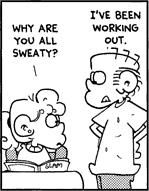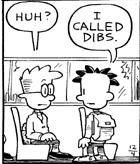Fear and Loathing in Detroit: Sports Reporters vs. Sports Bloggers
And here I thought I was having plenty of fun yesterday, watching college football while zonked out on muscle relaxers for my frighteningly aching back. While spending the day away from the computer, lying flat in the blissful state of a relatively flexible and painless lower back, it appears that a column written by the Detroit News' Chris McCosky had much the same effect on the Detroit sports blogosphere as tossing a molotov cocktail through the window of an unsuspecting home during family dinnertime.
This was brought to my attention by The Detroit Tigers Weblog's Billfer, so I'll begin by linking to his retort to McCosky's column. I don't know if I'm quite as outraged as Bill, but it's definitely amusing that a prominent member of the local sports media apparently feels so threatened by bloggers that he deems it necessary to explain why his work should be considered more credible, going so far as to remind his readers that he actually went to school to learn his trade.
Just so you know where I'm coming from on this, I went to school to study journalism too, and have some experience working as a credentialed member of the media. Some of that work included exchanging e-mails with Mr. McCosky for a Detroit Pistons season preview that I wrote for a magazine last year. (And even back then, he railed against the sports talk radio/message board culture that was apparently making him chase stories he felt he shouldn't have to.)
Maybe that's made me more reverential toward the media than I should be. I know beat writers, especially, put in long hours at the arena or ballpark pursuing the latest newsworthy information. They also have to cull that material - most of which isn't usually very revelatory or compelling - into something readable while working on a tight deadline, which can be pretty stressful work.
However, a lot of "reporting" is also watching a game and recounting what happened for the next morning's paper. They saw it, you saw it, and I saw it. Would our accounts of the same event that we all just witness really differ that greatly? Of course not. The only difference is that the media can go down to the locker room directly after the game and ask Jim Leyland why he didn't take Jason Grilli out after he loaded the bases or ask Grilli why he threw four straight balls when there wasn't an open base.
But really, how often is the answer to that question really informative? And how often is the person asking that question really going to challenge his or her subject when he knows he's getting a flat, meaningless response? If Leyland dismisses a question with "It was the right call, and I'd make it every time," how often is a simple "Why?" the follow-up query? How often does the mainstream media really take advantage of the access and opportunity that McCosky touts as the shiniest badge of honor for his profession?
I'm not saying it's easy. To ask a sharp, probing question face to face, and risk an angry response that could affect everyone else trying to do his or her job in that clubhouse, can be a difficult situation to deal with. I've had Dmitri Young, post-rehab, tell me to my face that he wasn't talking. And I didn't push the issue because it wouldn't have mattered. He didn't play in that particular game, and I was just looking for an easy interview to post on my magazine's website. Maybe I should've pushed it, but I didn't want the fledgling magazine I was working for to lose its credential because of my grandstanding.
I don't think a beat writer for one of the city's two major metropolitan newspapers is going to have the same problem. Would the Pistons really ban the Detroit News from the locker room or press row because one of the players got angry at its reporter? I seriously doubt it. Yet many writers act as if such a penalty could be incurred.
Go ahead and boast that you have to face a player or coach the day after bashing him in print. But that same boast is also frequently used as a shield to justify not asking tougher questions in the first place. ("Hey, I have to work with these people every day. I'm not pissing them off to make my job miserable.")
I've probably spent far too long on that particular point, so let's move on.
This is ridiculously reductive. To McCosky, it "seems" the hard work is bypassed because he apparently didn't look at much to back up his unsubstantiated assertion. Study what "stuff" exactly? If Billfer devotes a post to hitters' spray charts or Lee Panas writes about runs created by position, did no amount of work go into that? Did they just conjure that information out of thin air? No, they looked far deeper into the game than any member of the mainstream baseball media. And they did so because the information provided by those who are ostensibly the be-all, end-all authority on sports reporting doesn't tell enough of the story.
That brings up the ugly truth about the sports blogosphere that the mainstream media doesn't want to acknowledge. They created us.
Fans are increasingly not getting what they want and need from the conventional outlets of newspaper, TV, or radio. So we, as readers and fans, are either going to seek out the kind of information that's more in line with our thinking, that gives us another way of looking at the game, or just create that material ourselves. Along the way, we might even find something that we hadn't previously considered, and that feeling of discovery is a refreshing bit of flavor among all the gruel we're consistently served these days. And if many other fans weren't beginning to feel that way, McCosky wouldn't have felt it necessary to explain that his job is more important than our hobby.
Furthermore, if we "get something wrong," we're most certainly held accountable. Not only by our readers, but by other bloggers. It's why there's a comment section at the end of every post, so that readers can offer up an immediate response to something they agree or disagree with, a luxury conventional media hasn't offered them until relatively recently - likely in an attempt to keep pace with new media. Maybe that's another reason McCosky's so miffed at bloggers. Maybe his editors are suddenly asking him to keep up with an outlet that's providing a much quicker fix than the next morning's newspaper.
I want my writing to be taken seriously, so if I write that I believe Brad Wilkerson should be the Detroit Tigers' left fielder next season, I'm going to do everything I can to support that belief. Otherwise, why should anyone bother to read any of my material? Nothing's more humbling (and embarrassing) than being called out by a reader who can collapse your argument with a simple breath. No one understands how precious one's time is than those who invested their own into something almost purely out of love and interest. Those who don't take their work that seriously won't be getting much more of anyone's time. We don't receive the benefit of the doubt that many attribute to anything that's in print.
But while we're talking about what's in print, let's address another McCosky assertion:
There is not a single Detroit Tigers blog that posted this rumor about Joel Zumaya injuring his shoulder while dirt-biking. And if I'm wrong about that, McCosky didn't bother to point me to where I'd find this theory. As far as I can tell, the closest anyone came to that was me addressing that conspiracy theories were being floated out there and linking to a couple of places where such rumors could be found. I also said that such conjecture was irrelevant. And do you know what opened the door to such a subject being approached in the first place? An article by McCosky's colleague at the Detroit News, Lynn Henning:
That was in print. In a newspaper. Speculation. By a professional journalist. And message boards and commenters ran off from there. No blogger created that. Yet apparently, we're all swimming in the same cesspool that McCosky used to soak the brush he's painting the Detroit sports blogosphere with. This is exactly the type of irresponsible conduct he's charging sports bloggers with carrying out. And it didn't even happen. How's that for accountability?
Finally, McCosky proves just how original his thinking really is with the same old, tired shot that all those who find themselves threatened by new media love to take:
This is right up there with saying that Detroit sports fans still light cars on fire when they're celebrating a championship, the old stand-by writers from other cities pull out whenever their teams are playing one of ours. It's a throwaway comment that's actually easy, thoughtless hackery. Should I now make a crack about freeloading sportswriters gorging on complimentary food in the media lounge? (And the food provided on McCosky's beat at the Palace of Auburn Hills is pretty good.)
I'm also offended because I'm typing this in my home office (which happens to be on an upper level of my house) while wearing a sweatshirt and jeans. That's pretty much the same thing your sportswriting colleagues wear, based on my personal experience. The pajamas went in the hamper before I took a shower this morning. Get your facts straight like they taught you in school, McCosky. Well... at least he called us "clever." Maybe that's what McCosky was trying to be here, and this was just some poorly executed attempt at satire.
It's baffling to me how writers like Chris McCosky get so defensive about this stuff. Ask most sports fans where they get their news, or how they caught up on last night's game. A majority of them will still probably say the newspaper. And if they do read sports blogs, they still know who was on the scene to report on events as they occurred. They hear who's called an "insider" on the radio each week. They see who ESPN puts on the air as "experts."
So why feel so threatened? Why act like old man Tom Smykowski in Office Space, having to explain his job to that consultant, Bob Slydell, so he doesn't get laid off? ("Can't you understand that? What the hell is wrong with you people?") Is it because he sees his job changing, and doesn't like it? Is he having to chase rumors or write website material that you previously didn't have to? Are bloggers suddenly getting more credit than he thinks they should? (And if that's the case, let me know where that credit's being handed out, because I think a lot of us would love some of that.)
Maybe that's something he can address in print, after talking to some of the bloggers he criticized. You know, in person. Or even via e-mail. As an accountable professional journalist is supposed to, upholding the standards and ethics he or she was taught in school. Or is it just easier to attack and move on?
This was brought to my attention by The Detroit Tigers Weblog's Billfer, so I'll begin by linking to his retort to McCosky's column. I don't know if I'm quite as outraged as Bill, but it's definitely amusing that a prominent member of the local sports media apparently feels so threatened by bloggers that he deems it necessary to explain why his work should be considered more credible, going so far as to remind his readers that he actually went to school to learn his trade.
Journalism employs trained professionals. We actually have to go to school for this stuff. We take our jobs seriously. There are rules and standards that we are beholden to. There are ethics involved. We actually talk to, in person, the people we write about. If we rip somebody in an article, you best be sure most of us will confront that person the next day and take whatever medicine we need to take.
Just so you know where I'm coming from on this, I went to school to study journalism too, and have some experience working as a credentialed member of the media. Some of that work included exchanging e-mails with Mr. McCosky for a Detroit Pistons season preview that I wrote for a magazine last year. (And even back then, he railed against the sports talk radio/message board culture that was apparently making him chase stories he felt he shouldn't have to.)
Maybe that's made me more reverential toward the media than I should be. I know beat writers, especially, put in long hours at the arena or ballpark pursuing the latest newsworthy information. They also have to cull that material - most of which isn't usually very revelatory or compelling - into something readable while working on a tight deadline, which can be pretty stressful work.
However, a lot of "reporting" is also watching a game and recounting what happened for the next morning's paper. They saw it, you saw it, and I saw it. Would our accounts of the same event that we all just witness really differ that greatly? Of course not. The only difference is that the media can go down to the locker room directly after the game and ask Jim Leyland why he didn't take Jason Grilli out after he loaded the bases or ask Grilli why he threw four straight balls when there wasn't an open base.
But really, how often is the answer to that question really informative? And how often is the person asking that question really going to challenge his or her subject when he knows he's getting a flat, meaningless response? If Leyland dismisses a question with "It was the right call, and I'd make it every time," how often is a simple "Why?" the follow-up query? How often does the mainstream media really take advantage of the access and opportunity that McCosky touts as the shiniest badge of honor for his profession?
I'm not saying it's easy. To ask a sharp, probing question face to face, and risk an angry response that could affect everyone else trying to do his or her job in that clubhouse, can be a difficult situation to deal with. I've had Dmitri Young, post-rehab, tell me to my face that he wasn't talking. And I didn't push the issue because it wouldn't have mattered. He didn't play in that particular game, and I was just looking for an easy interview to post on my magazine's website. Maybe I should've pushed it, but I didn't want the fledgling magazine I was working for to lose its credential because of my grandstanding.
I don't think a beat writer for one of the city's two major metropolitan newspapers is going to have the same problem. Would the Pistons really ban the Detroit News from the locker room or press row because one of the players got angry at its reporter? I seriously doubt it. Yet many writers act as if such a penalty could be incurred.
Go ahead and boast that you have to face a player or coach the day after bashing him in print. But that same boast is also frequently used as a shield to justify not asking tougher questions in the first place. ("Hey, I have to work with these people every day. I'm not pissing them off to make my job miserable.")
I've probably spent far too long on that particular point, so let's move on.
With blogging and Web sites, it seems the hard work, standards, accountability, courage all of that is bypassed. Who needs to study this stuff, or attend games, or conduct interviews when you can just sit in your basement and clack out whatever comes through your head, right? If I rip somebody, or if I get something wrong, who cares? Nobody will see me.
This is ridiculously reductive. To McCosky, it "seems" the hard work is bypassed because he apparently didn't look at much to back up his unsubstantiated assertion. Study what "stuff" exactly? If Billfer devotes a post to hitters' spray charts or Lee Panas writes about runs created by position, did no amount of work go into that? Did they just conjure that information out of thin air? No, they looked far deeper into the game than any member of the mainstream baseball media. And they did so because the information provided by those who are ostensibly the be-all, end-all authority on sports reporting doesn't tell enough of the story.
That brings up the ugly truth about the sports blogosphere that the mainstream media doesn't want to acknowledge. They created us.
Fans are increasingly not getting what they want and need from the conventional outlets of newspaper, TV, or radio. So we, as readers and fans, are either going to seek out the kind of information that's more in line with our thinking, that gives us another way of looking at the game, or just create that material ourselves. Along the way, we might even find something that we hadn't previously considered, and that feeling of discovery is a refreshing bit of flavor among all the gruel we're consistently served these days. And if many other fans weren't beginning to feel that way, McCosky wouldn't have felt it necessary to explain that his job is more important than our hobby.
Furthermore, if we "get something wrong," we're most certainly held accountable. Not only by our readers, but by other bloggers. It's why there's a comment section at the end of every post, so that readers can offer up an immediate response to something they agree or disagree with, a luxury conventional media hasn't offered them until relatively recently - likely in an attempt to keep pace with new media. Maybe that's another reason McCosky's so miffed at bloggers. Maybe his editors are suddenly asking him to keep up with an outlet that's providing a much quicker fix than the next morning's newspaper.
I want my writing to be taken seriously, so if I write that I believe Brad Wilkerson should be the Detroit Tigers' left fielder next season, I'm going to do everything I can to support that belief. Otherwise, why should anyone bother to read any of my material? Nothing's more humbling (and embarrassing) than being called out by a reader who can collapse your argument with a simple breath. No one understands how precious one's time is than those who invested their own into something almost purely out of love and interest. Those who don't take their work that seriously won't be getting much more of anyone's time. We don't receive the benefit of the doubt that many attribute to anything that's in print.
But while we're talking about what's in print, let's address another McCosky assertion:
Bloggers are having a field day speculating on how Joel Zumaya really injured his shoulder. Nobody believes a heavy box fell on him. So the Internet is rife with stories about how he fell off his dirt bike.
There is not a single Detroit Tigers blog that posted this rumor about Joel Zumaya injuring his shoulder while dirt-biking. And if I'm wrong about that, McCosky didn't bother to point me to where I'd find this theory. As far as I can tell, the closest anyone came to that was me addressing that conspiracy theories were being floated out there and linking to a couple of places where such rumors could be found. I also said that such conjecture was irrelevant. And do you know what opened the door to such a subject being approached in the first place? An article by McCosky's colleague at the Detroit News, Lynn Henning:
The details of Zumaya's mishap, and the long lapse between the incident and Thursday's disclosure, raised at least as many questions as were answered.
That was in print. In a newspaper. Speculation. By a professional journalist. And message boards and commenters ran off from there. No blogger created that. Yet apparently, we're all swimming in the same cesspool that McCosky used to soak the brush he's painting the Detroit sports blogosphere with. This is exactly the type of irresponsible conduct he's charging sports bloggers with carrying out. And it didn't even happen. How's that for accountability?
Finally, McCosky proves just how original his thinking really is with the same old, tired shot that all those who find themselves threatened by new media love to take:
But you do have to know most reporters at legitimate news sources work hard to deliver fair, accurate and pertinent information.
And what they do is vastly different than what the clever dude in his pajamas is doing on his computer, down in his basement.
This is right up there with saying that Detroit sports fans still light cars on fire when they're celebrating a championship, the old stand-by writers from other cities pull out whenever their teams are playing one of ours. It's a throwaway comment that's actually easy, thoughtless hackery. Should I now make a crack about freeloading sportswriters gorging on complimentary food in the media lounge? (And the food provided on McCosky's beat at the Palace of Auburn Hills is pretty good.)
I'm also offended because I'm typing this in my home office (which happens to be on an upper level of my house) while wearing a sweatshirt and jeans. That's pretty much the same thing your sportswriting colleagues wear, based on my personal experience. The pajamas went in the hamper before I took a shower this morning. Get your facts straight like they taught you in school, McCosky. Well... at least he called us "clever." Maybe that's what McCosky was trying to be here, and this was just some poorly executed attempt at satire.
It's baffling to me how writers like Chris McCosky get so defensive about this stuff. Ask most sports fans where they get their news, or how they caught up on last night's game. A majority of them will still probably say the newspaper. And if they do read sports blogs, they still know who was on the scene to report on events as they occurred. They hear who's called an "insider" on the radio each week. They see who ESPN puts on the air as "experts."
So why feel so threatened? Why act like old man Tom Smykowski in Office Space, having to explain his job to that consultant, Bob Slydell, so he doesn't get laid off? ("Can't you understand that? What the hell is wrong with you people?") Is it because he sees his job changing, and doesn't like it? Is he having to chase rumors or write website material that you previously didn't have to? Are bloggers suddenly getting more credit than he thinks they should? (And if that's the case, let me know where that credit's being handed out, because I think a lot of us would love some of that.)
Maybe that's something he can address in print, after talking to some of the bloggers he criticized. You know, in person. Or even via e-mail. As an accountable professional journalist is supposed to, upholding the standards and ethics he or she was taught in school. Or is it just easier to attack and move on?


 sweatymen[at]gmail[dot]com
sweatymen[at]gmail[dot]com












